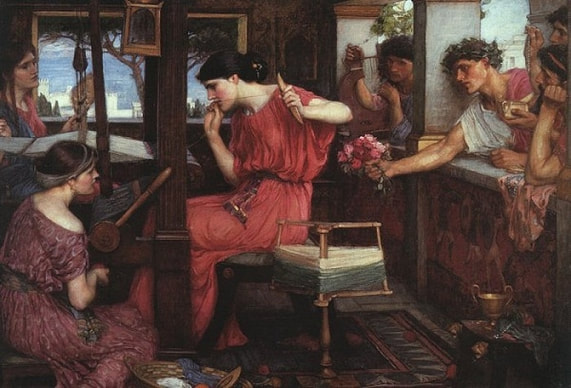|
11/17/2021 0 Comments Pity for PenelopePenelopiad by Margaret Atwood is a feminist retelling of Penelope, cousin to Helen and wife of Odysseus, following her from childhood, her marriage, the palace scandals, and to the underworld. Throughout the novel, Atwood explores the question: what actually led to the hanging of the maids?
At first, I sympathized with Penelope. She was thrown into the ocean as a baby and treated as a second option. Her marriage ceremony was filled with suitors who couldn't get first place prize: Helen. It wasn't that long into her marriage when Odysseus left for 20 years, so she had to raise Telemachus and run Ithaca. All this before 40? She was resilient. I couldn’t think of any reason not to support her. But I noticed a pattern in the syntax. When Penelope says something true at the time but is now a lie, she reiterates and corrects herself. She does that when she talks about Helen going unpunished, and when she talks with Odysseus about remaining faithful while he was away. On page 18, Penelope says that Helen was never punished for causing harm and suffering to those who made sacrifices to them while they were in the underworld. "Not that I mind. Not that I minded." In hindsight, she did care. Helen was safe, free from the consequences of her actions. It did not bother Penelope at the time, but as she is retelling, she tells the reader her truth. Penelope has lived in Helen's shadows. Helen had an extravagant background: she came out of an egg which was a product of Zeus raping Helen's mother in the form of a swan (17). Along with her Aphrodite-like beauty, Helen was an unstoppable force. In the underworld, "[T]he magicians insisted on seeing Helen, and she was willing to oblige...She has a kind of slow twirl she would do; then she'd lower her head and glance up into the face of whoever conjured up... and they were hers" (17). Helen manipulated the male gaze, even after death, all the while Penelope loathed with the asphodels. In living and in spirit, Penelope was bitter. Bitter that Helen could get away with manslaughter (18), Helen could start a war, as she once did. After the Trojan War but before Odysseus's return, Penelope was accused of having sex with the suitors. This is where I draw speculation. The novel (with exception of the chorus lines) is written from Penelope's perspective, yet in the chapter titled "Slanderous Gossip," she could clear her name. She can simply state: "I did not sleep with the suitors," or she can defend herself, and 12 maids die. We both know what decision Penelope made. When Penelope and Odysseus are in bed together exchanging 20 years' worth of stories, he says how much he has missed her, even when he was having sex with goddesses: Circe and Calypso. She tells him how much she has wept and would never be unfaithful. "It's a wonder either one of us believed a word the other said. But we did. Or so we told each other” (134). The two expert deceivers were at a standstill. Odysseus had no proof of her unfaithfulness, and Penelope had only her word. Whose life is more expendable: Penelope’s or the lives of 12 maids? She was constantly punished and secondary to Helen, so she projects the power imbalance to the maids and further abuses them. Here is an interesting piece about an interaction between Penelope, Odysseus, and the maids together.
0 Comments
Leave a Reply. |
|

